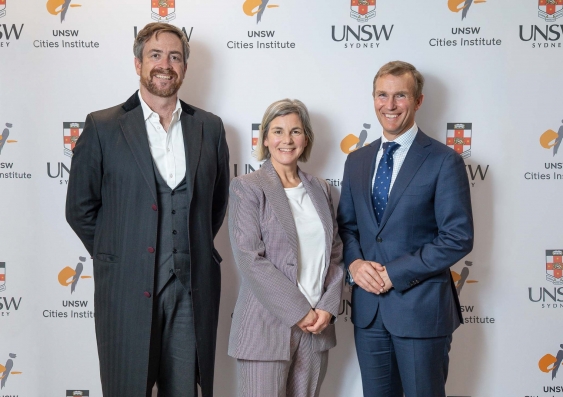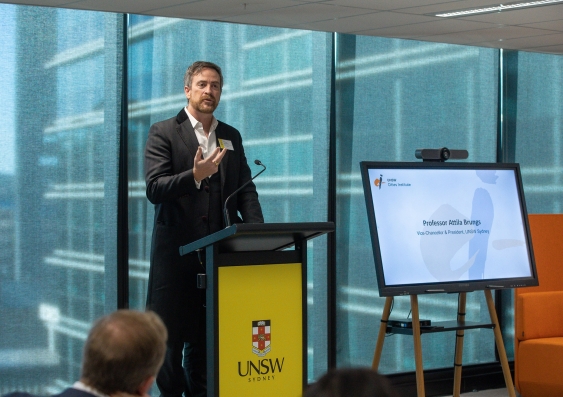ª π⁄≤ ∆± launches Cities Institute to help future-proof our cities
The Institute brings together diverse perspectives, expertise and experiences to solve the biggest challenges facing our cities.Ã˝
The Institute brings together diverse perspectives, expertise and experiences to solve the biggest challenges facing our cities.Ã˝

Larissa Baiocchi
Corporate Communications
+61 (0)452 229 349
l.baiocchi@unsw.edu.au
More than half the world‚Äôs population lives in urban areas and it is estimated by 2050, that number will increase to 68 per cent. However, with urbanisation comes challenges such as meeting the needs of growing urban populations and addressing the demand for housing, transportation, energy systems, and infrastructure while ensuring the benefits of urbanisation are inclusive, equitable and sustainable.Ã˝
To address these challenges, ª π⁄≤ ∆± Sydney has launched the , an independent institute working in partnership with government and industry to reinvent cities for sustainable, healthy, prosperous and socially just urban futures. Ã˝
The Cities Institute draws on ª π⁄≤ ∆±‚Äôs trademark disciplinary depth(1), breadth and excellence across the built environment, climate change, engineering and energy, health, design, economics, social sciences and justice as well as its impact to drive positive change. Ã˝
Read more:Ã˝
‚ÄúCities are one of humanity‚Äôs best inventions, fueling innovation, prosperity and diversity. But many are no longer fit for purpose. Increasingly they exacerbate climate change, ill health, and inequalities. They lack agility and resilience. We are optimistic that it doesn‚Äôt have to be that way,‚Äù says Professor Claire Annesley, Dean of ª π⁄≤ ∆± Arts, Design & Architecture. Ã˝
‚ÄúOur approach is to lead and accelerate positive change by building cross-disciplinary teams together with government, industry and communities, working together to develop innovative solutions to the problems facing our cities and our planet. This means getting climate change experts to work with population health, housing and transport experts to design and deliver a more resilient urban future.‚Äù Ã˝
The Cities Institute will curate multidisciplinary research projects and partnerships to make sure we are addressing and solving the most pressing issues in a joined-up and long-term way.Ã˝Ã˝
‚ÄúWe consulted widely with government, industry, communities and researchers to identify the first priority issues for the Cities Institute to tackle. These are affordable housing, active cities and urban governance,‚Äù says Prof Annesley. Ã˝

Prof Brungs says the Cities Institute will work locally to design innovative solutions that can be scaled and exported globally. Photo: ª π⁄≤ ∆±
Minister for Cities Rob Stokes said as global city regions expand, urban problems become more pressing and more complex.
‚ÄúAchieving sustainable urban development is one of the most urgent policy challenges of our time. The ª π⁄≤ ∆± Cities Institute will become a global powerhouse for urban research in a time of change," he said.
The Institute will be locally focused and globally orientated, combining a future-focused innovative design and research agenda with deep connections to place and the region‚Äôs First Nations peoples.Ã˝Ã˝
Read more:Ã˝
The Institute is establishing its base in Parramatta, a meeting place and crossroads of First Nations peoples for more than 60,000 years. Ã˝
ª π⁄≤ ∆±‚Äôs Innovation Hub in Parramatta places the institute at the intersection of NSW‚Äôs Six Cities strategy as the place where the east-west and north-south axis intersect.
The Six Cities Mega Region provides a living laboratory in which to design, develop and test innovative solutions to improve the liveability and prosperity of cities, including sustainable and resilient housing and transport solutions,‚Äù explains Geoff Roberts, Chief Commissioner of the Greater Cities Commission and member of the steering committee that established the Cities Institute. Ã˝Ã˝
ProfÃ˝Brungs says the Cities Institute will work locally to design innovative solutions that can be scaled and exported globally. Ã˝
‚ÄúThis means working closely with the NSW Government and the Greater Cities Commission, Transport for NSW and local councils and communities to design and test solutions which will have significant impact.Ã˝We live in exciting times where our technology, our imagination and our connectivity can result in profoundly different approaches.‚ÄùÃ˝
‚ÄúThe ª π⁄≤ ∆± Cities Institute will also facilitate global dialogues on cities through a ª π⁄≤ ∆± Cities Dialogue and train the next generation of global city shapers,‚Äù says Professor Brungs.Ã˝
The ª π⁄≤ ∆± Cities Institute will provide access to world-class research through an education program. A suite of products for city leaders across the globe will include a Master of Cities, Graduate Certificates, Diplomas and micro-credentialed short courses, including Digital Twins and Managing Urban Heat. Ã˝
Notes:Ã˝
1. ª π⁄≤ ∆± Cities Institute is a pan-university, cross-faculty initiative that represents all of ª π⁄≤ ∆±‚Äôs cities‚Äô interests across all faculties, including relevant research centres and labs. The institute is a multi-disciplinary venture, drawing on city expertise from seven faculties and over 10Ã˝schools and centres across the University, as well as strategic partners. One significant collaborator will be the Cities Futures Research Centre.Ã˝
The was established in 2005 at ª π⁄≤ ∆± and has developed into a national leader in scholarly applied public interest research about our cities. It undertakes world-class research in urban planning, housing, compact cities, health-built environments and urban analytics. The Centre conducts independent research and provides evidence-based inputs into contemporary urban policy debates and the planning of future cities.Ã˝